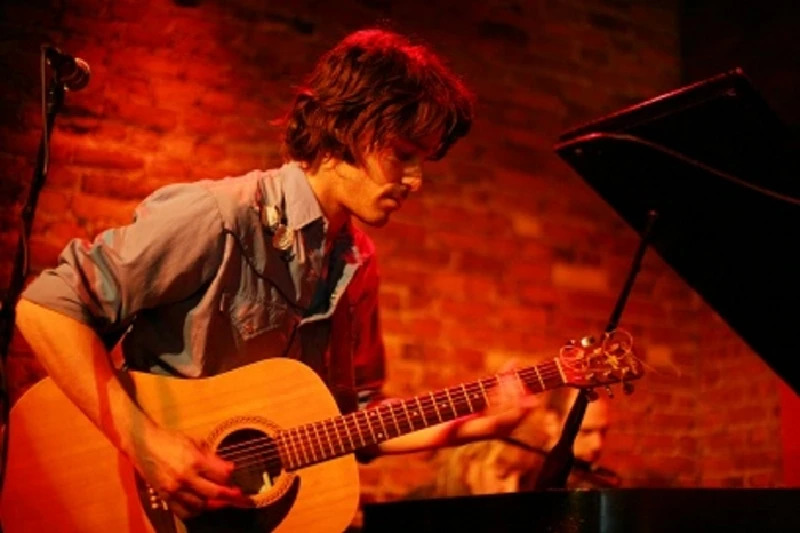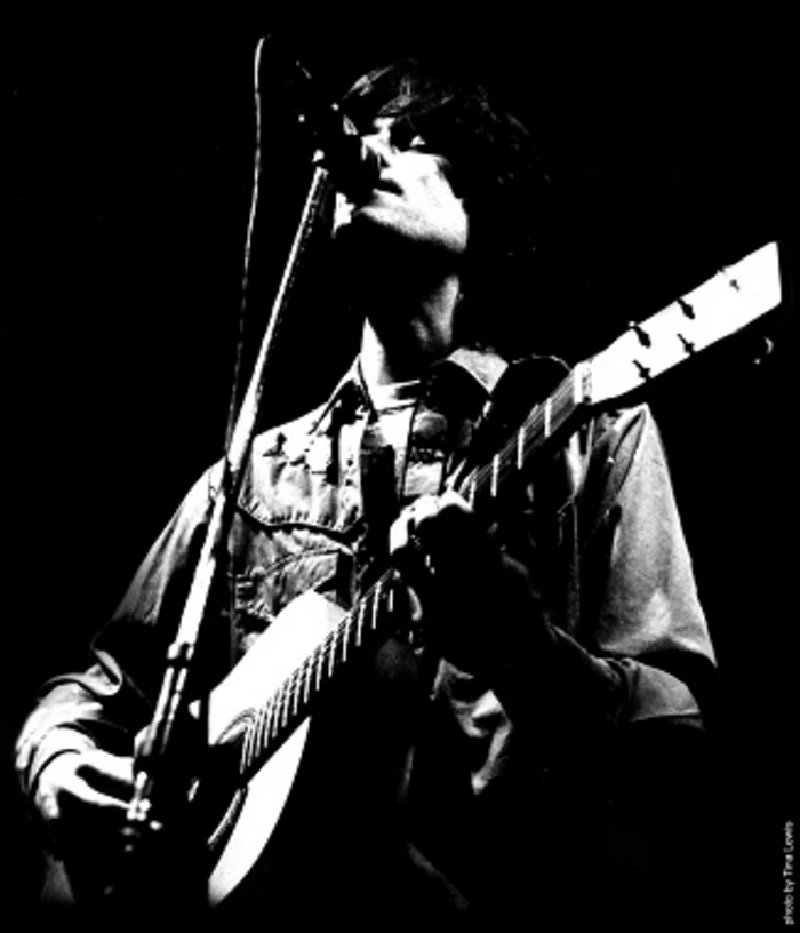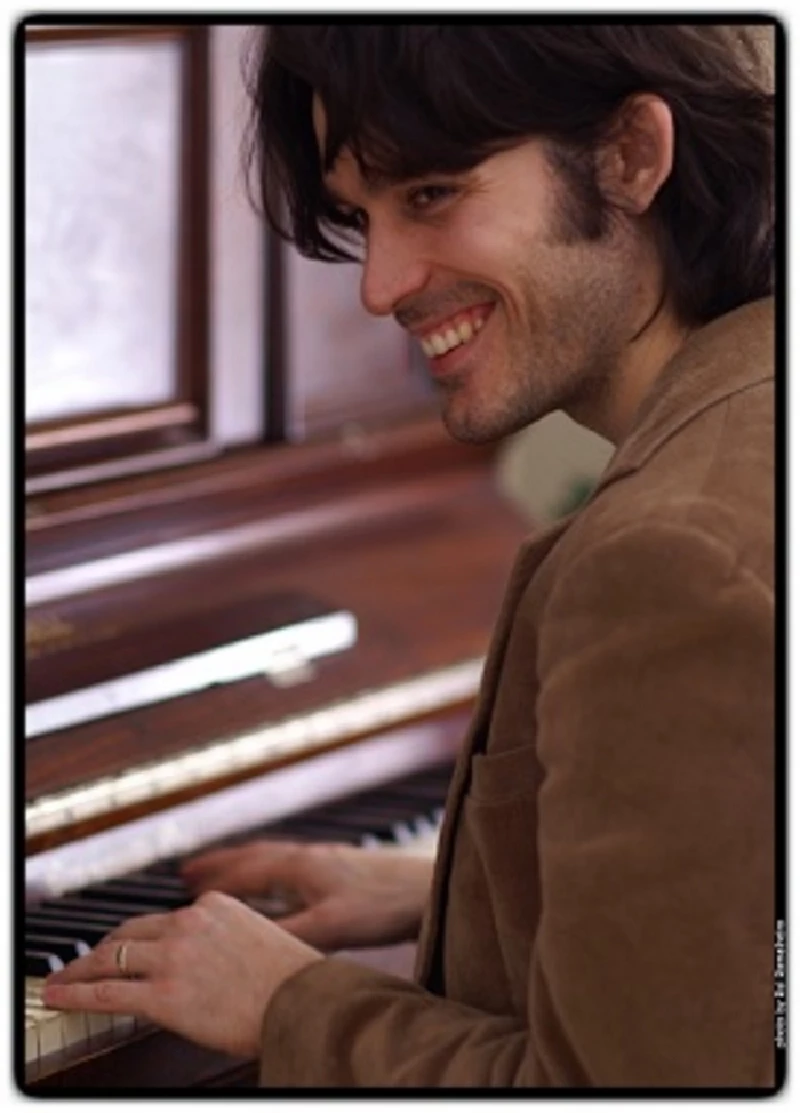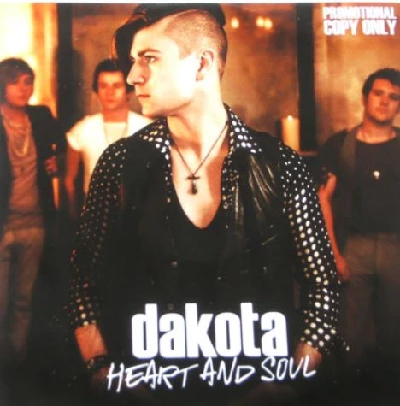David Celia - Interview
by Benjamin Howarth
published: 13 / 3 / 2012

intro
Ben Howarth speaks to Canadian singer-songwriter and roots rocker David Celia at a show in London about his latest album, 'I Tried', and continuous touring
I came across David Celia entirely by chance, enticed by a promotional quote from one of my favourite songwriters, Neil Hannon, accompanying his third album ‘I Tried’. He describes his music as “roots rock with hints of folk wrapped in a pop package”, which is a fair description, though it doesn’t emphasise the power of his songwriting. On each of his three albums, there are a few genuinely knock-you-down brilliant tracks, with McCartney-ish melodic swoops and deft arrangements. That he isn’t a household name can only be down to bad luck. A regular in Britain, Celia, who is from Toronto, has now toured the country more than he can remember – often venturing well beyond the beaten track. His most recent visit included stops in Lewes, Dartmouth, Boscombe and Stourbridge. I met him shortly before a low-key show at the Secret Garden in Battersea in South London. In advance of playing for nearly two hours, he sat down to answer my questions. PB: How has the tour been? DC: It’s been amazing. I’ve been here so many times, but to me it just gets a little bit better each time. Not a lot better, but a bit better each time! PB: Have any shows on the tour particularly stood out? DC: Equally, they’ve also been a little bit better each time. The actual performances, how chilled out we are. Last night was my favourite so far. We were in the Arts Centre in Bath, and all of a sudden we were spoiled with incredible sound. We had a good soundman and good monitors, so we could just step it up a little bit more than usual. And the other act, Piney Gir, were excellent. I’d never heard her music before, but now I’m a fan. PB: Have you been playing with a full band every night on this tour, or have you been doing some of them on your own? DC: It’s been a mix of both. Tonight I have Joan Besen on keyboards and Cleave Anderson on drums, with Dave Heaton on bass. This is a band tour because I got some funding that helped pay for flights, but often I just play as a duo or a solo gig, and I just kind of get by. So two of them flew over with me, and then Dave Heaton joined us here. He lives here now. He came over because of a girl! PB: So where does the funding come from? DC: It’s very difficult to get, but the fact that Canada offers it is amazing. It’s an arts council – this one is Ontario Arts Council, but there is one for the whole of Canada as well. It’s a lot of paperwork, and I hate doing that stuff, but I did it, and I got it. It turned a duo tour into a band tour. PB: So is this the first tour you’ve had funded, or have you had this support for a while? DC: I’ve only had it once before for a tour, and that was about six or seven years ago. That came from Canada Foreign Affairs, I don’t even know if they give funding out. It really makes a difference, because in England, if you’re just playing in small venues and pubs, it's hard to get by. You have to crash at people’s places and sleep on the floor. That’s what we still do. Actually it’s nice. I have friends all over this country now, and they put us up in their homes and take us in. It’s like family now. PB: So how many times have you been to Britain? DC: Jeez, I haven’t been counting, but it is somewhere between fifteen and twenty times. PB: You’ve been in other bands, before playing as a solo artist. So were the earlier times with them? DC: Actually, the first time I came by myself, just to check it out. And then the second time was with Invisible Ink, and we broke up after that, because the bass player was living over here, and he didn’t come back to Canada. It just wasn’t the same without him. So whenever I come over to the UK, I play with him. He’s going to be on stage with me tonight. PB: So when were you last here? DC: The last time was for Glastonbury, the second time we have played there. I’m a bit wiser about how to get around. But I barely saw anything to be honest. It was just about getting through the mud with all my gear. Joan was with me, and she’s a classy lady, so I had to carry her stuff through the mud. We slept in the tents, but we did a lot of gigs. We did lots of the small stages. It’s a lot of work, but it is totally worth it. PB: I noticed that, earlier on the tour, you happened to play at the Old Firehouse in Exeter. That was my local when I lived down there as a student. How was that gig? DC: We loved it, I’ve never been there before. We had the most radio play there, more than anywhere else before the gig. Phonic FM, the local radio station, were amazing. I did something on the phone with them, and then I also did something in the studio with them, actually with the promoter who put on the gig at the Old Firehouse. That was a good gig. It’s a place just like this actually, with a nice outside area and everyone is just pouring in and out. You know, they are not there for the music, but they do know that there is going to be music, and it was a challenge to see what would happen. But they were all into it. They were dancing. So then we went into the Phonic FM studio in the afternoon with the promoter. He noticed that we were into improvising, so he just put the mics on us, and said play, PB: So was that unplanned? DC: Oh yeah, it was just that night. He asked if we wanted to do it, and we said it depends how much sleep we get! And so we were exhausted. We ended up unwinding till about 5, but we were in there at 12, and we just jammed. It’s on their website, so you can still listen to it. I’m really glad we did that. PB: Your drummer was telling people at the bar earlier that you do lots of improvising. Does that mean there is quite a big difference how you sound live to how you sound on CD? DC: Yeah, definitely. One of these days I will find a producer who can work with us almost as an extra band member. But I produce the albums myself, so I end up taking a different approach – kind of the way that Todd Rundgren, or someone like that, working in their home studio, would approach it. So I think the albums have turned out well, but people always say that “Oh god, seeing you live is so different from your CDs.” PB: On ‘I Tried’, one of the distinguishing aspects are all the extra instruments, with string parts, horns and flutes. DC: I don’t limit myself. When I’m the studio, I try and get whatever the song needs, the best person. I don’t care how much it costs, I just do it. But live is different – I can do those songs acoustically. We do sometimes. But, in a venue like this, I probably won’t even plug in the acoustic guitar, I’ll just stay on the Strat. I may play the ukulele song with the flute – 'Life is a Dream'. PB: Ah, good, I like that one… DC: Well, as you said that, I’ll do it. PB: And 'Bug’s Apocalypse' is good too, if you are taking requests! DC: We haven’t done that this tour, I don’t think. That has a flute as well though. PB: Okay. Let’s go back a bit, now. When did you first start playing music and writing songs? DC: I started when I was ten. I would play drums along with my brother’s music. And then I had learned to play the guitar by the time I was thirteen. I stuck to guitar. I knew that was what I wanted to do. The trance it put me on, I knew. I started writing songs almost immediately. I had an old four-track and a looper. There was one called the sixteen second electro harmonics pedal, lots of musicians remember it but it's hard to find now, but it gave sixteen seconds of loop and you could synch in your chords, as modal or outside as you want, and then try to solo and not bore anybody. So, eventually, I started to write lyrics when I was in high school. PB: So at what point did you start to do solo performances? DC: After Invisible Ink broke up. It wasn’t official or anything, I just had all these songs that went on to be on 'Organica', my first record. It wasn’t gelling with Mark anymore now that Dave Heaton was living over here, and we just kind of went our separate ways. I ended up defaulting these five songs onto my first David Celia record, because I didn’t want to commit to a band name. I had a few guys that came with me to England around then, but I didn’t know how serious they were, and I didn’t want to default anyone into a band, so I just called it David Celia. It was very easy, and I haven’t been able to think of a name since. PB: So how did you meet the people you play with live and on the records? DC: Always socially first, you’ll meet someone, and then ask if they want to jam, and then if they want to do the gig. PB: So do you have plans for another album? DC: Yeah. Much like the other ones, I’m getting songs together as I tour. I have five songs recorded at the moment. I’ll have to go back in and do a little more to them. It usually takes a long time, a year or more to record, then another year to getting around to mixing it, and then a year to do everything you need to get it mixed. PB: What do you think of ‘I Tried’ now, as I guess it is quite old in your mind? DC: That one is the most personal, definitely. The lyrics are way more personal that anything I’ve done before. It was a bit scary, putting some of these songs out. I wasn’t sure how they were going to go over with people who had already developed an ear for what I was doing. Some of the songs are very similar to what I’d done before, but some are way off. It’s also the most orchestrated, and I’d never had horns on my albums before. I’m a producer for other bands as well, and I’d done things like that on their records, so I applied them to mine. The songs spoke for themselves and I knew that I needed to put more orchestration. PB: Was the change to a more personal style planned? DC: Oh, not at all. When I write songs, I’m only interested in that moment. I just love to record, just as someone who paints will just pick up their brush and feel inspired. So, later, listening to them in the car, that’s when I decide, “hey, that one would be good on an album”. PB: At what point do you decide what extra arrangements you will have. I’m thinking of a song like 'Wishful Thinking', which has a brilliant horn part on it. Did you know that you’d add something like that when you wrote it? DC: Sometimes I’m less conscious of it, but when I wrote that one on the piano, I knew there was going to be some big stuff behind it. I actually imagined saxophones, because I’d been listening a lot to Abdullah Ibrahim’s 'African River', a mindblowing album. He’s got a song called 'The Wedding', and I imagined something like that. But, you’re not set on it. It’s like when you come across a great jacket in a second-hand store, and you know you’re going to wear it every day. I came across him playing live with a friend of mine, and I heard his soft, puffy sound and knew that was what I wanted. He was very approachable, and he came in and did it, just like that. I just gave him full reign. He was a real pro. He was ill at the time, and he’s since died. He worked right up until he died. PB: Is that normally what you do with people who you play with, or will you often direct what they do? DC: Increasingly, more of the former. I’m getting more and more used to opening up and letting people get on with it. Because if you already know them, and you’ve cast them to be part of your music, then you probably should trust them. It is a special thing. But the flute parts on the album are a perfect example of both. On ‘Bug’s Apocalypse’, I knew exactly what I wanted, and I had the whole melody in my head, and I directed him through it. Then, on ‘Life is a Dream’, I said to do whatever he wanted. And what he did was perfect, and what that song called for. DC: What songs of yours are you most proud of? DC: Hmm… from my first album, ‘The Wind’. It’s just an instrumental that I love. I still love to play live. Then ‘Séverine’, from the last album. I wrote that song in English, but Dave Heaton actually translated it into French, so there is a French version as well. PB: Will your next album carry on with the wide range of musical styles? DC: Yes, definitely. PB: That’s good. DC: You into that? Good. Hopefully the world will be into that. That will help me pay the bills and all that. That’s what I’m into at the moment. Maybe someday I’ll make another more consistent album, like my second one ‘This Isn’t Here’, but at the moment I’m all over the map. PB: With such a range of styles, you must have a lot of musical influences. But are there any musicians that are a particular influence or that you aspire towards? DC: I don’t know if I aspire to be anyone else, I think I’m too old for that now. But there are definitely people that I would credit as having helped shape me. In the early days, I got into Judas Priest and all those metal bands, then Led Zeppelin, the Beatles and Pink Floyd were huge. Then, Neil Young helped me to sing because his voice is so himself, and that definitely helped me sing. Then other than that, Pat Metheny, Jimi Hendrix. I went through all the great guitarists styles, learned all their songs. PB: I read that you teach guitar… DC: I have done. I haven’t been doing it recently, unless someone asks me. I did a lesson for a friend about a month ago, and I think I have one when I get home to Canada. But it is just a one off thing. I used to do it for a living, to wean off factory jobs and get to do music full time. Then, I weaned off doing cover gigs to doing more original gigs, and I weaned off teaching to do more gigs. Now it's all original gigs. PB: And you mentioned doing producing as well, how much time do you spend doing that? DC: I used to do a lot of this for years, but less of that now. Now, because I’ve been doing it long enough, people will often call me and I can often choose what to produce. I’m working on two at the moment – one is my brother’s first album. I record in my house. The whole house is set up to record and then there are some studios that I can get into when I need to. PB: One last question – have you got any big ambitions that you’d love to achieve? DC: (Pauses to think) Hmm… playing the Pyramid Stage or something at Glastonbury, that idea would be nice. Then I’d love to hang out with people like Neil Young or Roger Waters, you know, just have a drink with them, be part of that scene. But I’m pretty content with what I’m doing. I’m pretty satisfied. Things seem to be looking up, I think. PB: Well, thanks. That seems like a good place to leave it.
Band Links:-
https://www.facebook.com/pages/David-Celia/20785624784http://www.davidcelia.com/
Picture Gallery:-


soundcloud
reviews |
|
Double Mind (2015) |

|
| On his fourth album, Canadian singer-guitarist David Celia finds a way to bridge the gap between his studio songcraft and his often improvised live shows |
| I Tried (2010) |
most viewed articles
current edition
Peter Doherty - Blackheath Halls, Blackheath and Palace Halls, Watford, 18/3/2025 and 21/3/2025Armory Show - Interview with Richard Jobson
Liz Mitchell - Interview
Lauren Mayberry - Photoscapes
Deb Googe and Cara Tivey - Interview
Max Bianco and the BlueHearts - Troubadour, London, 29/3/2025
Garfunkel and Garfunkel Jr. - Interview
Maarten Schiethart - Vinyl Stories
Clive Langer - Interview
Sukie Smith - Interview
previous editions
Heavenly - P.U.N.K. Girl EPBoomtown Rats - Ten Songs That Made Me Love....
Trudie Myerscough-Harris - Interview
Doris Brendel - Interview
Beautiful South - Ten Songs That Made Me Love...
Dwina Gibb - Interview
Kay Russell - Interview with Kay Russell
Pulp - Ten Songs That Made Me Love...
Barrie Barlow - Interview
Sound - Interview with Bi Marshall Part 1
most viewed reviews
current edition
Davey Woodward - Mumbo in the JumboNigel Stonier - Wolf Notes
Wings - Venus and Mars
Kate Daisy Grant and Nick Pynn - Songs For The Trees
Only Child - Holy Ghosts
Neil Campbell - The Turnaround
Philip Jeays - Victoria
Darkness - Dreams On Toast
Suzanne Vega - Flying With Angels
Charles Ellsworth - Cosmic Cannon Fodder
Pennyblackmusic Regular Contributors
Adrian Janes
Amanda J. Window
Andrew Twambley
Anthony Dhanendran
Benjamin Howarth
Cila Warncke
Daniel Cressey
Darren Aston
Dastardly
Dave Goodwin
Denzil Watson
Dominic B. Simpson
Eoghan Lyng
Fiona Hutchings
Harry Sherriff
Helen Tipping
Jamie Rowland
John Clarkson
Julie Cruickshank
Kimberly Bright
Lisa Torem
Maarten Schiethart